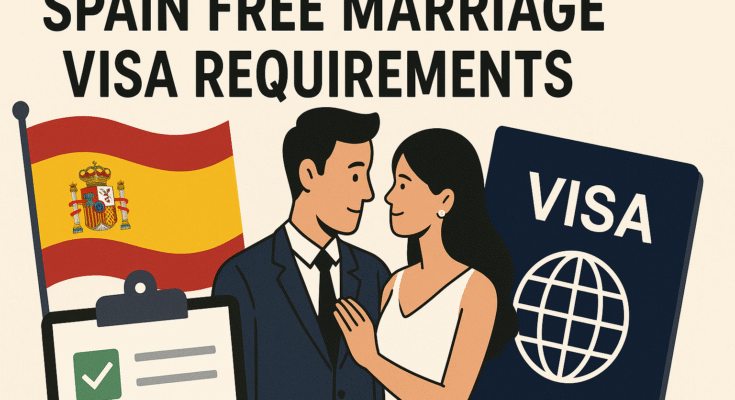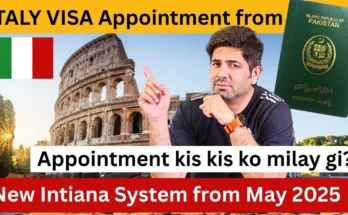Why Spain? A Dream Destination for Marriage & Immigration
Who wouldn’t want to get married in Spain? Sun-soaked beaches, romantic cities like Barcelona and Seville, and a welcoming culture make it a top destination for love and immigration. Beyond aesthetics, Spain offers appealing legal routes for foreign spouses.
What is a Marriage Visa?
A marriage visa lets a non-Spanish individual live and work in Spain based on their marriage to a Spanish or EU citizen living in Spain. Learn more from the official Spanish Ministry of Foreign Affairs.
🤔 Understanding the “Free Marriage Visa” Concept
Is It Really Free? Breaking Down the Term
The term “free” refers to the eligibility based on marriage, not zero cost. While it’s more affordable than a student or work visa, expect minimal administrative costs.
Government-Supported Marriage Schemes in Spain
Spain doesn’t have a dedicated “free visa” program, but under EU free movement laws, foreign spouses gain automatic rights. You can read more about that on the European Union Immigration Portal.
👥 Who Can Apply for a Marriage Visa in Spain?
Spanish Citizens Marrying Non-EU Nationals
A Spanish citizen marrying a foreigner can sponsor their residency permit. You’ll find guidelines under the Ministry of Inclusion, Social Security and Migration.
EU Citizens Residing in Spain
EU nationals who legally reside in Spain can also sponsor non-EU spouses under the same process as Spaniards.
Refugees and Asylum Seekers – Special Considerations
If either partner has refugee status, Spain offers flexible and humanitarian processes. See the UNHCR Spain website for more.
📜 Legal Requirements for Marriage in Spain
Civil vs Religious Marriages
Only civil marriages are legally valid for immigration. Religious marriages must also be registered with the Spanish Civil Registry.
Age and Marital Status Restrictions
You must be 18+, and legally single or divorced. The UK Government’s Spain Marriage Guide offers clear guidance for UK citizens marrying in Spain.
🗂 Documents Needed for a Spain Marriage Visa
Personal Identification Documents
You’ll need:
-
Valid Passport
-
National ID (for Spanish spouse)
-
Certified translations if required
Proof of Legal Capacity to Marry
-
Birth certificate
-
Divorce or death certificate (if previously married)
Relationship Proof (Photos, Chats, Visits)
Immigration officers want to see:
-
Joint travel records
-
Social media interactions
-
Video calls, family introductions
📝 Step-by-Step Process to Apply for a Spain Marriage Visa
1. Get a Spanish Marriage Certificate
Visit your local Civil Registry Office. You may need to attend an interview to prove your relationship.
2. Register the Marriage
After marriage, register it with:
3. Apply for Residency (Tarjeta de Residencia)
Apply through the Foreigner’s Office for your residence card (TIE).
⏳ Timeline and Processing Duration
Marriage Registration Timelines
The process usually takes 2 to 4 months, depending on documentation and backlog.
Visa Processing Time After Marriage
Expect your residence card to arrive within 60–90 days post-marriage registration.
🌟 Benefits of the Spain Marriage Visa
Legal Stay and Work Rights
You can live, work, and travel across all Schengen Area countries. For full visa-free access, check the Schengen Visa Info site.
Access to Healthcare and Education
Foreign spouses with legal residence are entitled to public healthcare. Learn more at Spain’s National Health System.
Pathway to Spanish Citizenship
If married to a Spaniard, you can apply for citizenship after just 1 year of legal residence. Details on the Ministry of Justice website.
❌ Common Mistakes and How to Avoid Them
Documentation Errors
Forgetting to legalize or translate documents is the #1 reason for rejection.
Interview Mistakes
Sounding scripted is a red flag. Be authentic, honest, and confident.
Misunderstanding Visa Types
People confuse family reunification with the marriage visa. Get advice from a licensed immigration lawyer in Spain.
🏡 Living in Spain After Getting Married
Cost of Living in Spain
Spain is one of the most affordable countries in Western Europe. Explore Numbeo’s cost of living guide for insights.
Integrating Into Spanish Society
Joining language schools or using Duolingo can help you fit in quickly. Locals appreciate the effort.
Job Opportunities and Language Barriers
Check job listings on InfoJobs or LinkedIn Spain.
🔄 Alternatives If You Can’t Marry in Spain
Long-Term Partner Visa (Pareja de Hecho)
Registering as a civil couple gives similar residency rights. Read more about it here.
Family Reunification Visa
If already married outside Spain, apply under Reagrupación Familiar from your home country through the Spanish consulate.
🚫 Marriage Fraud and Legal Consequences
What Constitutes Marriage Fraud?
A marriage for immigration purposes only — with no real relationship — is fraud. Spain investigates thoroughly.
Penalties and Deportation Risks
Fraudulent marriages can lead to:
-
Fines up to €10,000
-
Visa ban across Schengen Area
-
Legal action or jail
❤️ Real-Life Stories: Couples Who Got Their Visa Through Marriage
Success Story 1: A Pakistani-Spanish Couple
Ali and Maria met on Instagram, married in Valencia, and now run a small café. Their story was featured on The Local Spain.
Success Story 2: Overcoming the Language Barrier
Priya from India learned Spanish using Babbel and now works in a tourism agency in Malaga.
🧠 Useful Tips from Immigration Experts
Be Honest in Interviews
Inconsistencies in your story can get flagged. Always stick to the truth.
Hire a Good Lawyer If Needed
Especially if your case involves prior visa rejections or expired stays. You can find help at Legalitas Spain.
Stay Updated with Immigration Law Changes
Laws change fast. Bookmark and check the SEF website regularly.
🧾 Conclusion
Spain offers a golden opportunity for couples to live, love, and grow together under one sun-drenched sky. While the term “free marriage visa” is a bit of a myth, the marriage-based residency path is real, powerful, and attainable. Just stay honest, organized, and informed. And if you dream of tapas and togetherness — Spain is ready for you.
❓FAQs
1. Can I get a Spain marriage visa if we marry online?
No, Spain requires in-person marriage — online marriages aren’t recognized.
2. Do I need to speak Spanish for the visa interview?
No, but knowing Spanish helps. You can bring a translator if needed.
3. How long do I have to stay married to keep my visa?
At least 3 years, unless you’ve already applied for citizenship.
4. Can I work in Spain on a marriage visa?
Yes, after receiving your Tarjeta de Residencia, you can legally work.
5. What if we get divorced after getting the visa?
If you’ve been married and legally residing for 3+ years, you may keep your residency.



